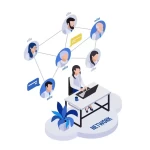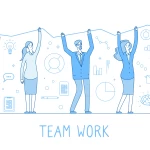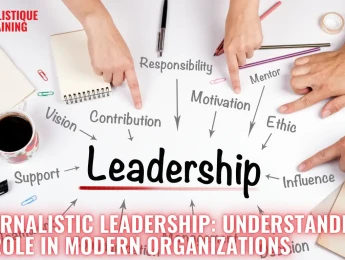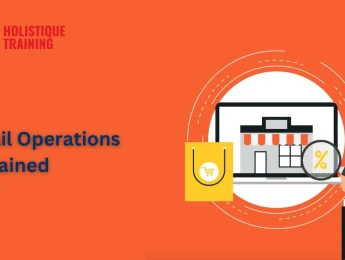- Table of Contents
- Introduction
- What Is Collaboration in the Workplace?
- Why Is Collaboration Important?
- Enhanced Creativity and Innovation
- Improved Problem-Solving
- Heightened Employee Engagement
- Knowledge Sharing and Learning
- Increased Adaptability and Resilience
- Enhanced Decision-Making
- Improved Conflict Resolution
- 5 Essential Collaboration Skills in the Workplace
- Effective Communication
- Time Management and Accountability
- Flexibility and Adaptability
- Conflict Resolution
- Empathy and Emotional Intelligence
- How to Include Collaboration Skills in a Job Application
- 1- Tailor Your Resume
- 2- Craft Engaging Cover Letters
- 3- Provide References
- 4- Be Interview-Ready
- The Challenges of Collaboration in the Workplace
- Communication Barriers
- Conflicting Personalities
- Time Zone Differences
- Decision-Making Struggles
- Unequal Contributions
- Managing Conflicts
- Maintaining Accountability
- Fostering Collaboration in Remote Teams
- 1. Leverage Technology for Seamless Communication
- 2. Establish Clear Expectations and Guidelines
- 3. Cultivate a Virtual Team Culture
- 4. Prioritise Relationship Building
- 5. Provide Training on Remote Collaboration Tools
- 6. Foster Inclusivity and Equal Participation
- 7. Schedule Virtual Team-Building Activities
- Conclusion
Introduction
Collaboration, the art of seamlessly working together towards a common objective, has emerged as a linchpin of modern organisational success. Beyond mere teamwork, it entails a harmonious interplay of talents, ideas, and perspectives, creating a fertile ground for innovation and growth. In the dynamic landscape of the workplace, mastering collaboration skills has become a prized asset, propelling individuals and teams to exceptional achievements. From effective communication to fostering empathy, these skills empower professionals to navigate the challenges of collective endeavours with finesse. In this blog post, we delve into the essence of collaboration, its pivotal significance, the five quintessential skills that fuel its success, how to strategically present them in job applications, and the inevitable hurdles one might face in the pursuit of collaborative excellence.
What Is Collaboration in the Workplace?
Collaboration in the workplace refers to the process of individuals working together to achieve a common goal. It goes beyond merely coexisting in the same office; it involves actively engaging with one another, sharing ideas, and pooling resources to solve problems and generate innovative solutions. Collaborative environments thrive on mutual respect, trust, open communication, and a willingness to embrace diverse perspectives.
Why Is Collaboration Important?
Collaboration in the workplace is not a mere buzzword; it is a strategic imperative for modern organisations In fact, according toGo Remotely, approximately 75% of employees recognise the significance of collaboration and teamwork, ranking it among the top four essential skills for their future success. Let's explore the multifaceted reasons why collaboration holds such significant importance:
Enhanced Creativity and Innovation
Collaboration brings together individuals with diverse skill sets, backgrounds, and perspectives. This amalgamation of ideas creates a rich tapestry of creativity, fostering an environment where innovation thrives. When people from different disciplines collaborate, they can see problems from various angles and propose inventive solutions that might not have been possible in a siloed approach. Moreover, the cross-pollination of ideas often leads to breakthrough innovations that drive the organisation forward.
Improved Problem-Solving
Tackling complex challenges demands a collective effort. Collaboration empowers teams to pool their intellectual resources, brainstorm together, and devise robust solutions. The synergy of minds helps identify blind spots, refine concepts, and evaluate potential risks more comprehensively. Additionally, when team members feel comfortable sharing their insights without fear of judgement, the depth of analysis and problem-solving capabilities soar.
Heightened Employee Engagement
In a collaborative environment, employees feel valued and included in decision-making processes. They become active contributors rather than passive workers, and their opinions carry weight in shaping outcomes. This heightened sense of involvement fosters a strong sense of belonging,job satisfaction, and overallengagement. Engaged employees are more likely to be dedicated to the organisation's mission, leading to higher productivity and lower turnover rates.
Knowledge Sharing and Learning
Collaboration serves as a conduit for continuous learning and knowledge sharing. When team members work together, they can tap into each other's expertise, learn new skills, and exchange best practices. This sharing of knowledge helps build a learning culture within the organisation, fostering personal and professional growth for all involved.
Increased Adaptability and Resilience
In rapidly evolving markets, adaptability is crucial for an organisation's survival. Collaborative teams are better equipped to respond swiftly to changes, as they leverage their collective insights and skills to adapt to new situations. They can pivot their strategies, adjust to market trends, and overcome challenges with agility and resilience.
Enhanced Decision-Making
Collaborativedecision-making ensures that choices are made with a more comprehensive understanding of the situation. When multiple perspectives are considered, decisions are less likely to be biassed or influenced by personal agendas. This not only leads to better outcomes but also fosters a sense of ownership and commitment to the chosen course of action among team members.
Improved Conflict Resolution
Conflict is inevitable in any group setting, but effective collaboration provides a framework for addressing and resolving conflicts constructively. When team members are skilled in conflict resolution, they can navigate disagreements without damaging relationships. This enables teams to stay focused on their objectives and work through challenges with a unified purpose.
5 Essential Collaboration Skills in the Workplace
With a clear understanding of why collaboration holds such paramount importance in the workplace, let's now delve into the five essential collaboration skills that pave the way for effective teamwork and exceptional achievements:
Effective Communication
Communication lies at the core of successful collaboration. It involves not only expressing your ideas clearly but also actively listening to others. To be an effective communicator, you must be open to feedback, ask clarifying questions, and avoid making assumptions. Remember, misunderstandings can lead to conflicts and hinder the collaborative process. Embrace different communication channels, such as in-person discussions, video conferences, emails, andproject management tools, to keep everyone on the same page. No wonder that a majority of employers, constituting 56%, utilise online collaboration tools and social media as channels for communication with their employees, according toZippia.
Time Management and Accountability
Collaboration involves multiple moving parts, making time management andaccountability crucial skills. Respect deadlines, set realistic goals, and prioritise tasks to ensure the project progresses smoothly. Being accountable means taking ownership of your responsibilities and acknowledging mistakes when they occur. Encourage a culture of accountability within your team, where each member takes pride in their contributions and is committed to delivering quality results.
Flexibility and Adaptability
Collaboration often requires flexibility and adaptability, as teams encounter unforeseen challenges and changes along the way. Being open to new ideas, adjusting your approach when necessary, and being willing to compromise are essential traits for successful collaboration. Embrace change as an opportunity for growth and learning, and encourage others to do the same.
Conflict Resolution
In collaborative settings, conflicts are bound to arise. The ability to address conflicts constructively is crucial to maintaining a harmonious and productive team dynamic. Rather than avoiding conflicts, seek to understand the root cause and work towards finding a resolution that benefits everyone involved. Emphasise a solution-oriented mindset and focus on the common goal to overcome challenges collectively.
Empathy and Emotional Intelligence
Empathy and emotional intelligence are integral to building strong connections within a team. Understanding the feelings and perspectives of your colleagues helps create a supportive and inclusive environment. By putting yourself in others' shoes, you can better anticipate their needs, address concerns, and demonstrate genuine care for their well-being. Emotional intelligence also enables you to manage your emotions effectively, fostering a positive and respectful atmosphere for collaboration.
How to Include Collaboration Skills in a Job Application
As collaboration skills have become increasingly valuable to employers, showcasing them in your job application can significantly boost your chances of landing your dream role. Here's how you can effectively demonstrate your collaboration skills:
1- Tailor Your Resume
When tailoring your resume to highlight collaboration skills, focus on specific achievements that showcase your ability to work effectively in a team. Highlight instances where you played a key role in achieving collective goals or completing projects. Use quantifiable metrics whenever possible to demonstrate the impact of your contributions. For example, if you were part of a team that increased sales, improved efficiency, or launched a successful campaign, quantify the results to provide a clear picture of your collaborative success.
Moreover, emphasise not only the outcomes but also your role in fostering a collaborative environment. Mention any leadership roles you undertook within the team or initiatives you spearheaded to enhance teamwork. This demonstrates not only your ability to contribute to a team but also your capacity to facilitate collaboration among team members.
2- Craft Engaging Cover Letters
In your cover letter, go beyond merely stating that you possess collaboration skills. Instead, convey a genuine passion for working collaboratively and relate it to the specific role you are applying for. Discuss experiences where your collaborative efforts led to innovative solutions, increased productivity, or improved team dynamics. Be specific about the challenges you faced and how your collaborative approach contributed to overcoming them.
Highlight your adaptability and flexibility in different collaborative settings, showcasing your ability to work effectively with diverse teams. Use storytelling techniques to make your experiences memorable and to provide the hiring manager with a clear understanding of how you approach collaboration in a way that adds value to the team and organisation.
3- Provide References
References can be a powerful testament to your collaboration skills. Select references who have firsthand knowledge of your ability to work collaboratively. Ideally, these references should be from individuals you've worked with in professional settings or on projects where collaboration was crucial.
Encourage your references to share specific examples of successful collaborative endeavours you were part of. This could include instances where your teamwork led to successful project completion, creative problem-solving, or the development of innovative ideas. Hearing directly from colleagues or supervisors about your collaborative strengths adds credibility to your claims and provides a more comprehensive view of your abilities.
4- Be Interview-Ready
Prepare for interviews by reflecting on your past collaboration experiences. Anticipate questions related to teamwork and be ready to discuss not only your successes but also challenges you faced and how you navigated through them. Use the STAR method (Situation, Task, Action, Result) to structure your responses, providing a clear narrative of your collaborative skills in action.
Demonstrate your understanding of the importance of collaboration in the context of the specific role you are interviewing for. Discuss how your collaborative approach aligns with the company culture and goals. Showcase your adaptability by sharing instances where you adjusted your collaborative style to fit the needs of different projects or teams. Additionally, be prepared to articulate how your collaboration skills contribute to the overall success of a team and the achievement of organisational objectives.
The Challenges of Collaboration in the Workplace
While collaboration offers immense benefits, it is not without its share of challenges. Navigating these obstacles requires a combination of patience, adaptability, and effective communication. Let's explore some of the common challenges faced during collaborative endeavours:
Communication Barriers
Effective communication is the backbone of successful collaboration, but various barriers can impede the flow of information. Differences in communication styles, language barriers, or even conflicting schedules can lead to misunderstandings and misinterpretations. As teams become more geographically diverse, virtual communication platforms can further exacerbate these challenges. Overcoming communication barriers demands active efforts to foster transparent, empathetic, and inclusive communication practices.
Conflicting Personalities
In collaborative environments, team members often hail from diverse backgrounds, each with their unique personalities, work styles, and preferences. While this diversity can be advantageous for creativity, it may also lead to conflicts and clashes in viewpoints. Some individuals might be more assertive and outspoken, while others may be introverted or conflict-averse. Effective collaboration necessitates embracing and appreciating these differences while fostering an atmosphere of mutual respect and understanding.
Time Zone Differences
In an increasingly globalised world, collaboration often involves teams dispersed across different time zones. Coordinating schedules and arranging synchronous meetings can be challenging, potentially leading to delays in decision-making and project progress. To address this, teams must implement strategies for asynchronous communication and task management, leveraging technology to bridge the time zone gap.
Decision-Making Struggles
Collaborative decision-making can be time-consuming and complex, especially when multiple perspectives are involved. Disagreements on the best course of action may arise, leading to decision-making paralysis or suboptimal choices. It is essential to establish clear decision-making processes, with roles and responsibilities clearly defined. Encouraging open dialogue, embracing constructive feedback, and seeking consensus whenever possible can facilitate smoother decision-making.
Unequal Contributions
In some collaborative settings, certain team members may contribute more significantly than others. This can create feelings of inequity, demotivate enthusiastic contributors, and lead to an imbalanced distribution of workload. Addressing unequal contributions requires proactive communication, encouraging equal participation, and recognising and celebrating individual efforts to foster a sense of collective ownership and shared responsibility.
Managing Conflicts
Conflict is a natural part of collaboration, arising from differences in opinions, priorities, or approaches. Unresolved conflicts can escalate and undermine team cohesion and productivity. Emphasising a culture of constructive conflict resolution, where conflicts are addressed respectfully and transparently, is key to overcoming these challenges. Encourage open dialogue, active listening, and a focus on finding win-win solutions that benefit the entire team.
Maintaining Accountability
In collaborative settings, it can be challenging to track individual contributions and ensure accountability. Without clear accountability mechanisms, tasks may fall through the cracks, deadlines may be missed, and the overall progress of the project may suffer. Implementing project management tools, setting measurable goals, and fostering a culture of mutual accountability can help mitigate these challenges.
Fostering Collaboration in Remote Teams
In the ever-evolving landscape of work, remote teams have become increasingly prevalent, challenging traditional notions of collaboration. Nurturing collaboration within a dispersed team requires intentional efforts to overcome the physical distance and potential communication barriers. Here are key strategies to foster collaboration in a remote team:
1. Leverage Technology for Seamless Communication
In a remote setting, effective communication is paramount. Embrace a variety of communication tools such as video conferencing, messaging apps, and project management platforms. Regular virtual meetings help recreate the dynamics of in-person collaboration, allowing team members to connect, share ideas, and maintain a sense of camaraderie.
2. Establish Clear Expectations and Guidelines
Define clear expectations for communication frequency, response times, and project updates. Establishing guidelines helps create a structured workflow, ensuring that team members are on the same page regarding deadlines and priorities. Clearly articulated expectations contribute to a smoother collaborative experience, especially in the absence of physical proximity.
3. Cultivate a Virtual Team Culture
Building a sense of camaraderie and team spirit in a virtual environment is crucial. Encourage casual conversations and create virtual spaces for social interactions. Utilise video calls not only for work-related discussions but also for team-building activities or virtual coffee breaks. This helps foster a positive team culture, enhancing the overall collaborative experience.
4. Prioritise Relationship Building
Remote collaboration doesn't negate the importance of personal connections. Allocate time for team members to share more about themselves during virtual meetings, allowing everyone to understand each other on a more personal level. This humanises the remote work experience and strengthens the bonds that are essential for effective collaboration.
5. Provide Training on Remote Collaboration Tools
Ensure that your team is proficient in the tools and technologies essential for remote collaboration. Offeringtraining sessions on video conferencing etiquette, effective use of project management tools, and other relevant technologies can empower team members to navigate the virtual work environment seamlessly.
6. Foster Inclusivity and Equal Participation
In dispersed teams, it's essential to create an inclusive environment where every team member feels valued and heard. Actively seek input from all members during virtual meetings, and encourage diverse perspectives. Inclusivity not only enhances collaboration but also contributes to a more innovative and dynamic team.
7. Schedule Virtual Team-Building Activities
Organise virtual team-building activities to strengthen the sense of unity among team members. These activities can range from online games and quizzes to virtual workshops. Such initiatives contribute to a positive team dynamic, fostering collaboration beyond the confines of formal work tasks.
Table 1: Virtual team-building activities to foster collaboration
Activity | Description |
Online Escape Room | Collaborative problem-solving adventure game. |
Virtual Coffee Breaks | Informal, interactive discussions for team bonding. |
Team Trivia Night | Fun quiz promoting friendly competition and unity. |
Virtual Scavenger Hunt | Interactive, engaging search-and-find activity online. |
Collaborative Playlist Creation | Build a shared music playlist, fostering unity. |
In short, fostering collaboration in remote teams demands a strategic approach that acknowledges the unique challenges posed by virtual work environments. By embracing technology, setting clear expectations, cultivating a virtual team culture, prioritising relationship building, providing training, fostering inclusivity, and organising virtual team-building activities, you can create a collaborative remote team that excels in achieving shared goals. Remember, the essence of collaboration remains intact, transcending physical boundaries and propelling teams towards unprecedented success.
Conclusion
Mastering collaboration skills is not just a matter of ticking off checkboxes; it's an ongoing journey of personal and professional growth. By nurturing effective communication, flexibility, conflict resolution, empathy, and accountability, you can become an invaluable asset to any team and organisation. Remember, collaboration isn't about overshadowing others but rather about combining strengths to achieve something greater than the sum of its parts. Embrace the challenges, celebrate the successes, and watch as your collaborative efforts lead to remarkable achievements in both your career and personal life.
As you strive to develop and enhance your essential collaboration skills, consider enrolling in our transformative course, ‘Essential Teamwork Development and Cooperation Skills,’ where you'll receive expert guidance and practical tools to excel in collaborative environments. Unlock your potential as a collaborative leader, and pave the way for extraordinary achievements both in your career and personal endeavours. Together, let's embrace the power of collaboration and soar to new heights of success!
























